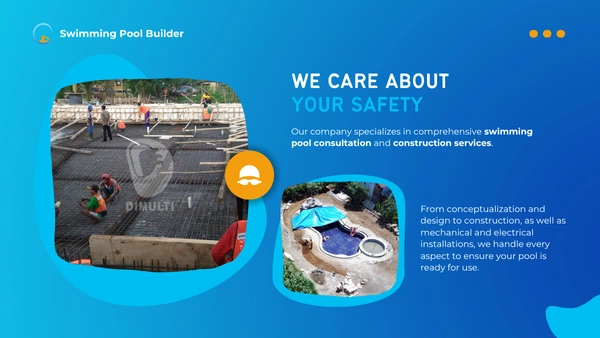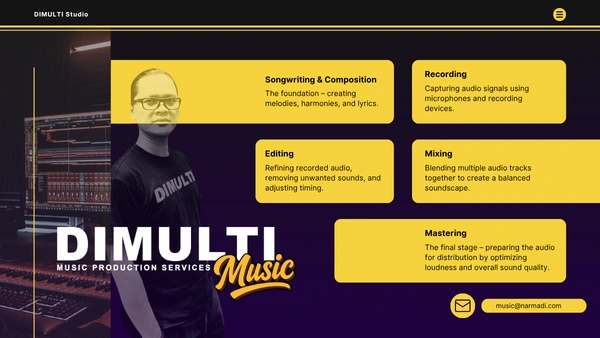Type Approval for Thailand
NBTC Certification! Unlocking Market Access in Thailand Through Type Approval. Serving since 2008, we specialize in securing type approval certification for radio (RF), wireless, and telecom products in Thailand, simplifying your market entry.

NBTC Certification! Unlocking Market Access in Thailand Through Type Approval
The Thailand market is important for telecom and wireless products due to its strong and expanding digital infrastructure, high smartphone penetration, and a growing demand for mobile connectivity. As one of the largest economies in Southeast Asia, Thailand offers significant opportunities for telecom companies and wireless product manufacturers. Additionally, its strategic location makes it a gateway to the broader ASEAN market, further enhancing its value for businesses looking to expand in the region.
To enter the Thailand market, especially for ICT products such as telecom and wireless devices, manufacturers must comply with a regulatory requirement known as “NBTC certification”.
NBTC stands for the National Broadcasting and Telecommunications Commission, a government agency responsible for regulating and setting policies in the Information and Communication Technology (ICT) sector. Notable tasks managed by the NBTC include the restructuring of 3G, 4G, and 5G frequency bands, as well as conducting frequency auctions. Additionally, the NBTC oversees the licensing of telecom and wireless products intended for sale or use in Thailand.
We provide expert support throughout the entire product sample management process, including selection, preparation, pre-testing, and shipping.
Our services extend to preparing required documentation, drafting agreements, labeling, and collaborating with local importers and RF/EMC laboratories.
With our extensive knowledge of local regulations, we ensure a smooth and efficient path to accessing the Thailand market.
NBTC Certification Procedures
The Thailand NBTC type approval certification does not require local testing for product approval. Instead, certification can be obtained through a documentation-based process, which involves reviewing existing RF (Radio Frequency) and EMC (Electromagnetic Compatibility) reports, as well as other relevant test reports like safety, EMF, and SAR.
The NBTC accepts internationally recognized standards, such as CE certification, to meet the approval requirements. This streamlined process offers flexibility for companies looking to enter the Thai market without the need for additional local testing.
Classification of NBTC Type Approval Certificates
The NBTC Type Approval Certificate is divided into three categories based on the product type and its intended use:
- Class A (Registration): Products in this category must undergo testing at an NBTC-designated lab. Applicants are also required to provide specific data to obtain a login account and certificate.
- Class B (Approval Certification): Similar to Class A, but products in this category can use foreign test reports (e.g., CE or FCC) during the approval process. Applicants must also submit the necessary data to get a login account and certificate.
- Supplier Declaration of Conformity (SDoC): This applies to radio products such as Bluetooth, WiFi, RFID, and SRD. SDoC is generally voluntary, and applicants can apply for it if they choose.
Example of NBTC Certificate
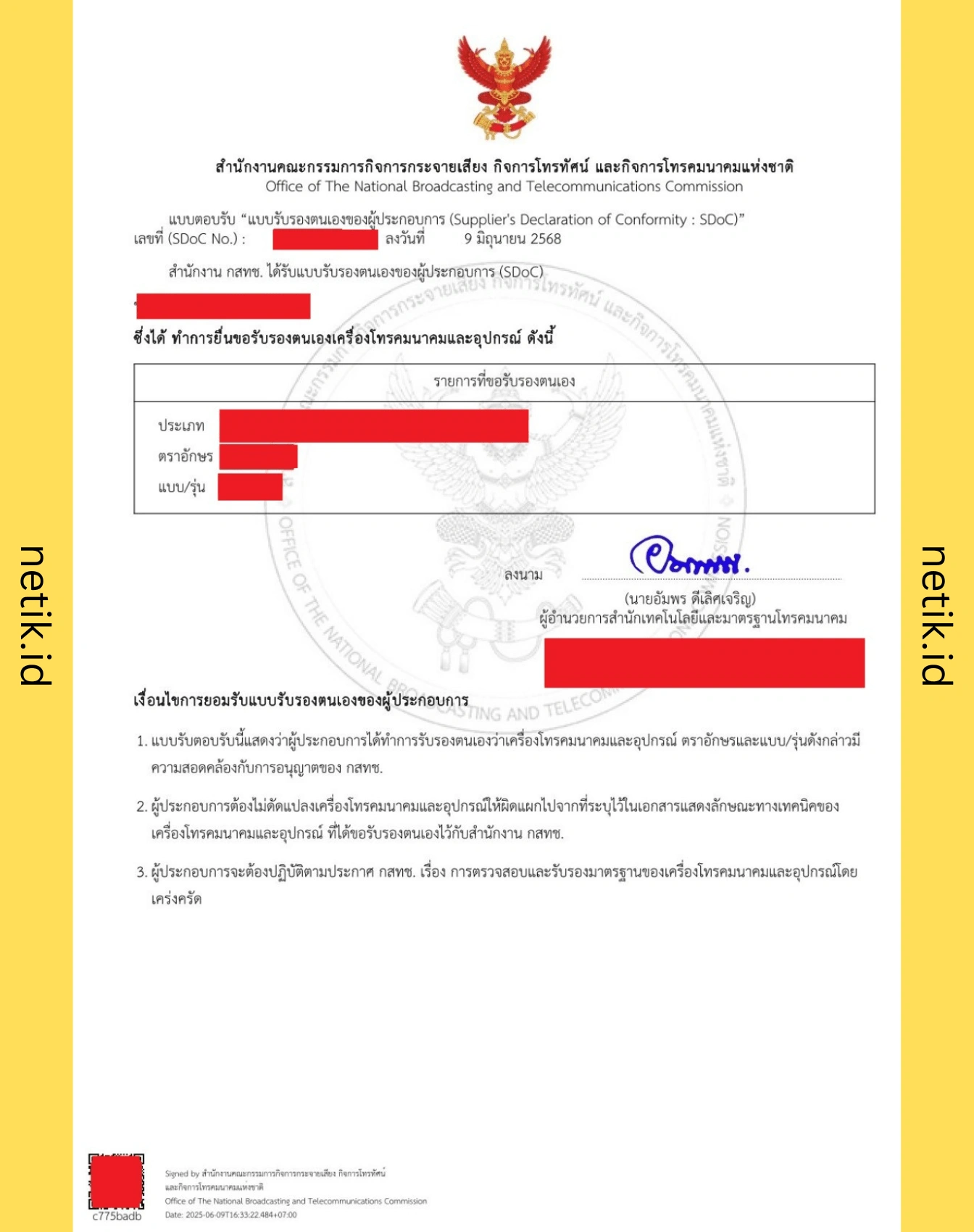
Lead Time and Validity
Lead Time: According to the official NBTC circular, the lead time is 4-8 weeks from the receipt of the sample.
Validity: The NBTC certificate has no expiration date. It remains valid indefinitely unless the product undergoes modifications or changes.
NBTC Type Approval Certification Label Requirements
Once a product receives the NBTC certificate, a conformity mark must be applied. The guidelines for applying this mark are as follows:
Class A Equipment:
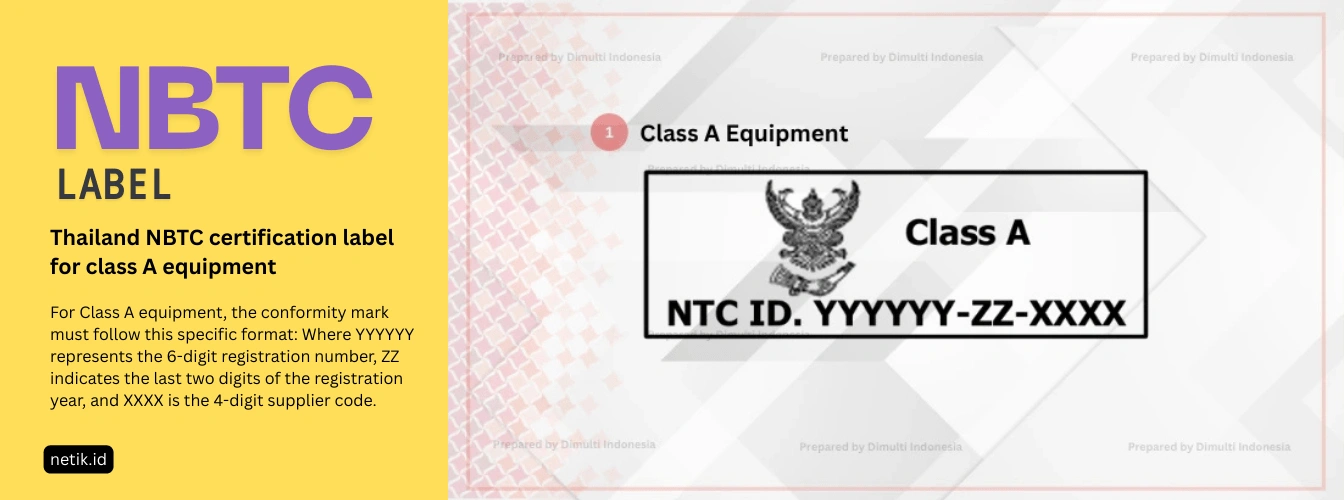
For Class A equipment, the conformity mark must follow this specific format: Where YYYYYY represents the 6-digit registration number, ZZ indicates the last two digits of the registration year, and XXXX is the 4-digit supplier code.
Class B Equipment:
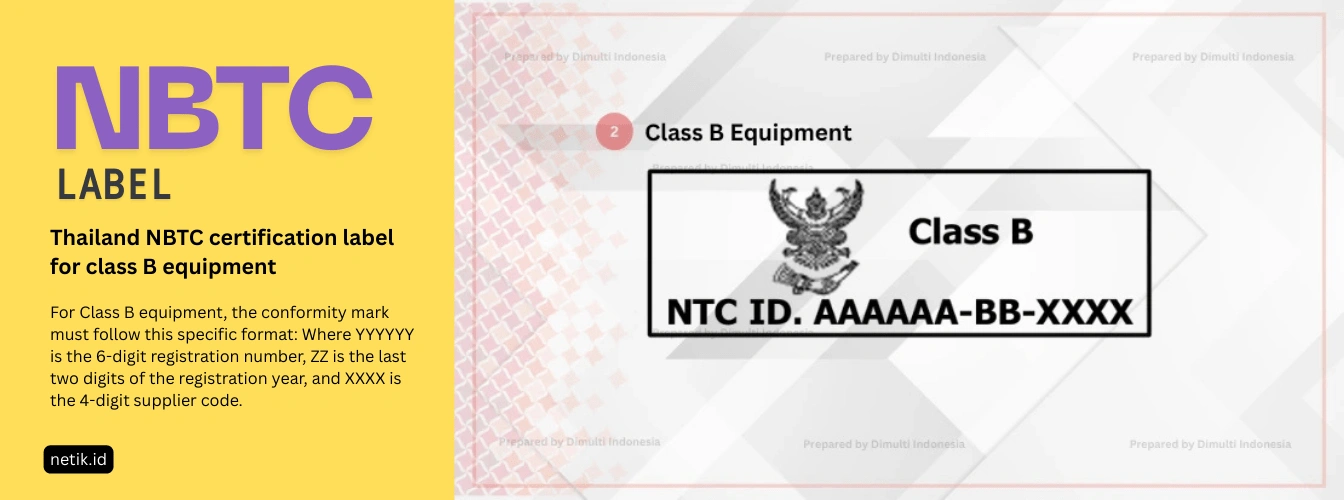
For Class B equipment, the conformity mark must follow this specific format: Where YYYYYY is the 6-digit registration number, ZZ is the last two digits of the registration year, and XXXX is the 4-digit supplier code.
Both Class A and Class B labels must be affixed to the product surface in a visible and easily accessible location. The labels must be applied using a secure method that prevents them from being easily removed.
If the label cannot be applied directly to the product, for example, due to its small size, it may be placed on the packaging or any accompanying materials, such as the user manual or compliance sheet.
SDoC Products
For SDoC products, the supplier is required to affix a label indicating that the product complies with specific Thailand standards. The label should include the following wording format:
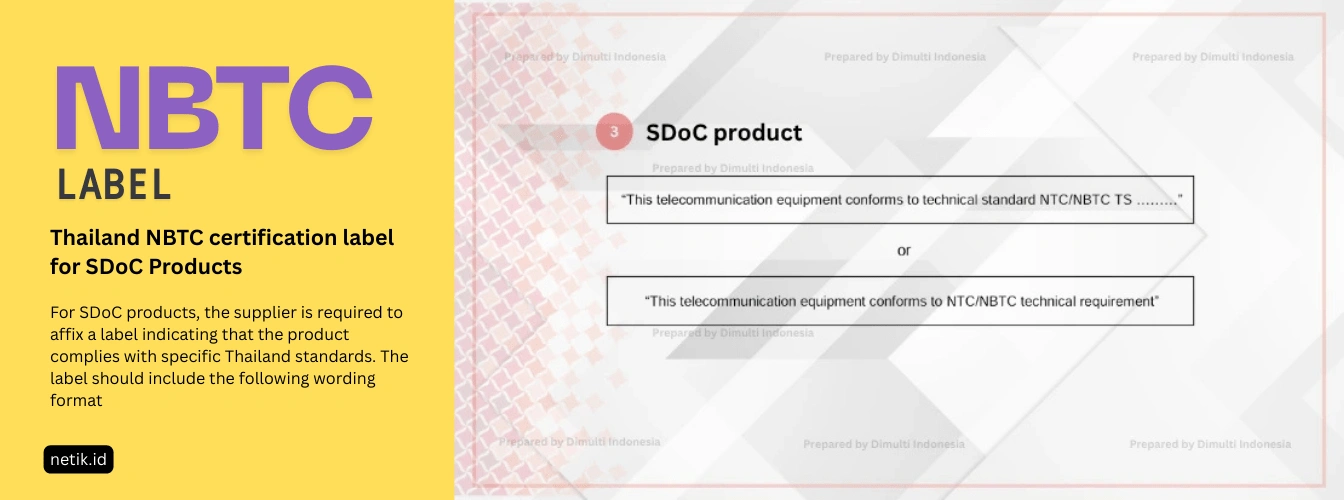
This statement must be included in the user manual or any other accompanying documents, such as the product specification sheet or compliance sheet.
FAQ Thailand NBTC Type Approval
Here are some frequently asked questions and their answers to help you understand the process better.
What documents are required to obtain NBTC certification?
To apply for NBTC type approval certification, the required documents typically include an application form (usually provided by the agency), specification sheets, product photos, RF and EMC test reports, and other relevant test reports such as safety, EMF, and SAR.
Who can apply for Thailand Type Approval Certification, the manufacturer or the importer?
For Thailand Type Approval, NBTC allows the use of a local representative or a Thai agency as the certificate holder. However, it is preferable for the actual importer to hold the certificate, as this allows them to use it for sales and import activities.
Is testing required for NBTC Certification?
Yes, product testing is mandatory for NBTC type approval certification. The test reports must come from international labs accredited to ISO/IEC 17025, as NBTC does not require local test reports.
What are the sample requirements?
It does not need a sample for (SDoC, Class A, or Class B).
How can I obtain a Type Approval certificate through paperwork?
For Thailand NBTC certification, the process can be completed through paperwork by evaluating existing certifications such as CE, FCC, CB, and others.
What is the lead time for Thailand NBTC Certification?
The lead time is typically 4-8 weeks.
What is the validity period of the Thailand NBTC Certificate?
The NBTC type approval certificate does not have an expiration date and remains valid indefinitely unless the product undergoes modifications.
What are the requirements for the NBTC Certification Label?
After obtaining NBTC certification, the product must display the conformity mark. For both Class A and Class B, the label should be placed on a visible and easily accessible part of the product, and it must be securely affixed so it cannot be easily removed. For SDoC products, a label must also be attached to indicate compliance with specific Thai standards.
I do appreciate the very professional, prompt, and thoughtful service and support from your team all the time.
I feel happy to cooperate with Dimulti, any time there is chance talking with my friends for Indonesia certification service, I would recommend them with Dimulti.

JULIA
Let’s work together on your next project
Looking for a trusted partner for your brand? Choose us for expert solutions that turn your vision into reality – with quality and care at every step.
